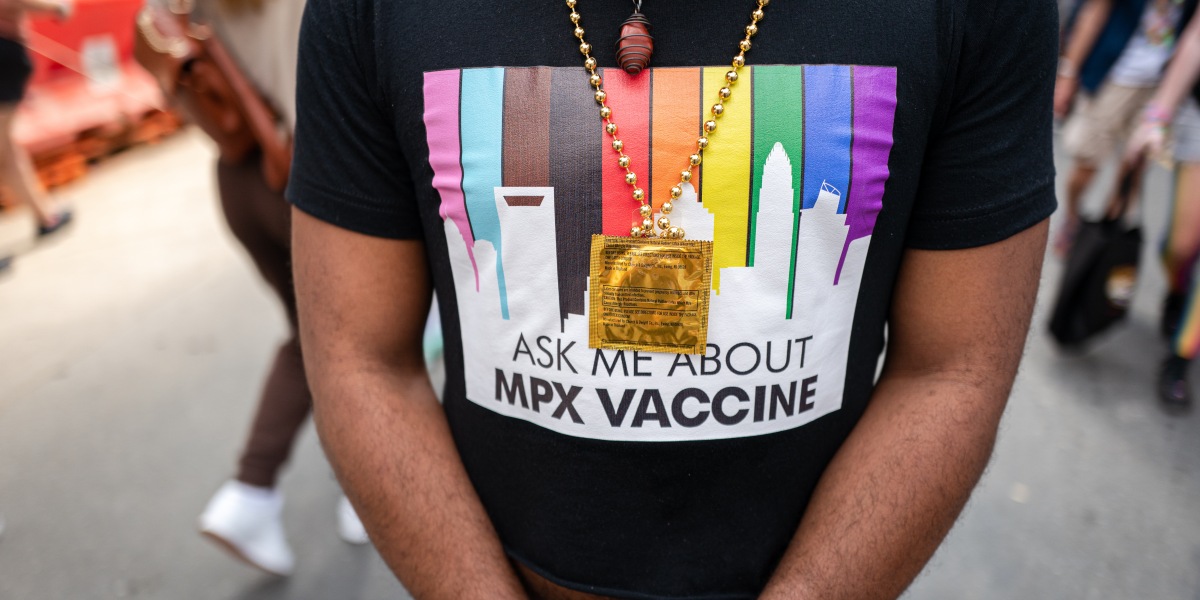Monkeypox cases are declining in the US and worldwide. However, new cases are piling up among gay and bisexual people of color, White House officials said Thursday — a worrying trend that is dampening otherwise positive news.
New cases of the potentially deadly virus have fallen nearly 50% in the United States since early August, Bob Fenton, White House coordinator for the monkeypox response, said at a news conference Thursday.
While some areas of the US are still seeing increases in cases, the overall decline has led US health officials to “cautious optimism,” Dr. Rochelle Walensky, director of the US Centers for Disease Control and Prevention.
Still, black men who have sex with men continue to see a higher proportion of cases than white men — this is because they receive one of the lowest proportions of vaccines, federal health officials have acknowledged.
Last week, 38% of new cases were in black men, 26% in white men, and 25% in Hispanic men. But black people received only 12% of the first doses of the smallpox vaccine Jynneos, used to fight monkeypox, while Hispanic people received 21% and white people 41%, Walensky said.
Federal health officials on Thursday detailed efforts to reach minorities with education and vaccinations. They called on Congress to allocate funds to the public health emergency declared in August. They are currently using funds earmarked for HIV and other sexually transmitted infections to pay for monkeypox efforts, they said, adding that the virus is commonly transmitted between people with HIV and other STIs.
Nearly 23,000 cases of monkeypox have been diagnosed in the United States since May, according to CDC data. Nearly 60,000 cases have been identified worldwide, the vast majority in countries where monkeypox is not endemic.
Up until this year, monkeypox was usually diagnosed in rural Africa, where people have close contact with infected rats and squirrels. Since May, tens of thousands of cases have been diagnosed on every continent – the vast majority in places where historically no cases have occurred.
In human-to-human transmission, the virus is usually spread through close contact, which may include sex and contact with personal items such as bed sheets and clothing. It traditionally brings flu-like symptoms before a characteristic rash appears. However, in the current outbreak, only one lesion is sometimes seen, often in the genital area, and flu-like symptoms are not always present.
More than 60% of US individuals diagnosed with monkeypox during the current outbreak have had HIV and/or at least one other sexually transmitted disease, they said.
Health officials also offered information on clinical trials for TPOXX, an antiviral smallpox drug used to treat monkeypox, and expressed concern about the possible development of drug resistance.
And they detailed a CDC-sponsored study of Jynneos in the Democratic Republic of the Congo (DRC) that could shed light on whether a tenth dose of the vaccine would provide the same protection against the virus as a fifth dose.
In August, the U.S. Food and Drug Administration approved an emergency use authorization that allowed doses of Jynneos that are normally given subcutaneously — under the skin through a shot — to be divided into fifths and given intradermally — between layers of skin — instead. The dose sparing regime was intended to expand the government’s limited vaccine supply.
Smaller doses should be just as effective, if not more effective, than conventional doses, federal health officials said at the time, since they’re administered just under the skin, where a person might encounter the virus, as opposed to under the skin, where they wouldn’t.
While the US has enough vaccines for vulnerable populations, other countries like the DCR don’t, said Dr. Anthony Fauci, director of the National Institute of Allergy and Infectious Diseases and physician to the President. The strain of the virus circulating worldwide, Clade IIb, has a relatively low mortality rate. But another strain, Clade I, with a mortality rate of about 10%, circulates in the DCR and elsewhere in Africa where health workers are particularly at risk.
If one-tenth of Jynneos were as effective as one-fifth, vaccine doses would double internationally, particularly to help countries where Clade I is circulating, Fauci said.
Sign up for the Fortune Features Email list so you don’t miss our biggest features, exclusive interviews and investigations.
#Monkeypox #cases #falling #nationwide #theyre #rising #key #groups #White #House #officials


Leave a Comment